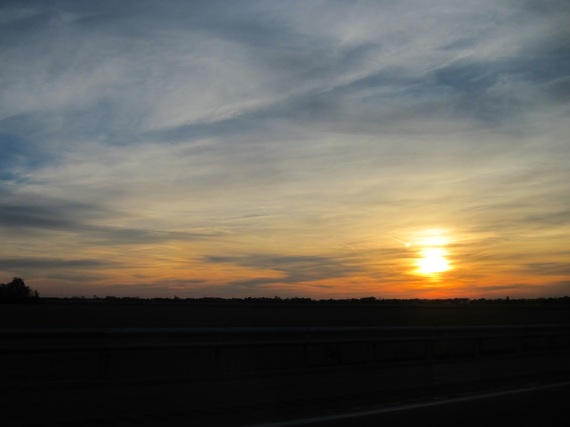This post contains spoilers about Star Wars Episode VII: The Force Awakens
This week, I went to see Star Wars: The Force Awakens on the day of the winter solstice. It seemed appropriate. After all, the Star Wars universe is built around metaphors of light and dark, fire and shadow. These tales yearn for the tenuous return of light.
Fittingly, it is our modern flickering hearth -- the screen -- that we turn to at this darkest moment of the year. When the sun slips away, I put on the most grandiose, dualistic epics I can find. As a teenager, this meant wearing out my VHS copies of the original Star Wars trilogy (really original, as in "Han shot first!"). I curled up in the den and got lost in an epic that featured majestic stars and Yoda's warm, shadowed cave.
The battles were more fantastic and compelling than the Maccabean stories I imbibed at Hanukkah; the mystical Force soothed my longing for a Christmas tree adorned with shiny ornaments and my lonely-Jew-on-Christmas syndrome. Salvation, power, and compassion all awaited me there. The Force was available to all -- as disquieting as a religious revelation and as comforting as hot chocolate.
A decade later, the Lord of the Rings films, beginning with The Fellowship of the Ring (2001), ushered in each December with a balance between cozy hobbit holes and the fires of Mordor. So too did many installments of Harry Potter and The Hunger Games ... and the list goes on.
Why do sci-fi and fantasy films have so many summer premieres, but strike such a deep chord in the winter? Is it just the fire? The brilliant "Darth Vader" Yule Log features the dark father's funeral pyre flickering and crackling on a five-hour long loop. Here, pagan funeral tradition meets a pagan winter solstice tradition that became a Euro-American Christian custom--a ritual that was also mass-produced decades ago in the age of television reproduction. That virtual hearth has now been comically replicated in the digital world.
But no, it's not just the fire or the sparkly explosions. It's also not just a "mythical mashup," though that is part of it, and I love S. Brent Plate's use of that phrase. Countering Walter Benjamin's critiques of what art loses in an "age of mechanical reproduction," Plate also argues that:
Films like Star Wars confirm that some semblance of an aura is alive and well in this dispersed, postmodern, postindustrial world. These films tell us something too about our ongoing desire for the sacred mysteries and ritualistic events that, increasingly, have been fulfilled by mass media for masses of people.
Some critics argue that the Star Wars universe is not just a mythic universe filled with a bricolage of world traditions (and this is not a bad thing); it is also a dualistic one, characterized by sharp divides between good and evil. Stark "good/evil" and "us/them" binaries rarely lead to good things politically- to put it mildly. On this, I agree.
A close reading of the films reveals more nuances. In Attack of the Clones and Revenge of the Sith, Anakin Skywalker's fall is precipitated by feelings: grief and fear over the deaths of those he loves most. In The Empire Strikes Back, Luke sees his own darkness in his vision in the cave on Dagobah. In The Force Awakens, Finn is a Storm Trooper turned savior. Kylo Ren balances on a precipice of cosmic confusion, and no, I don't think his patricide places him soundly on the dark side--though he could clearly use a good therapist.
In The Atlantic, David Sims argues that the fanfare surrounding the new film "is the stuff of nostalgia," and he's not wrong. The Force Awakens is a tremendous, wonderful film, but it is not a wildly original one. So what?
Many of the countless news pieces on the film include their authors' recollections of the first time they saw Star Wars. A special issue of People quizzes the younger members of the cast, and John Boyega had to admit that his first film was The Phantom Menace. "I'm a 90s baby; don't judge me," he said. To each generation, a new Star Wars is given.
Winter envelops us in a nostalgic mode. This year, Star Wars revelry has turned the solstice season into one of nostomania. Even for non-Christian Americans, December brings to mind impossibly ideal Normal Rockwell tableaus and Dickensian ghosts of Christmases past. Nostalgia, at its linguistic root, is a painful longing for home, including homes we have never quite inhabited. Writing in Time, Lev Grossman compares the galaxy far, far away to a hidden snow-covered land that is very different from the Planet Hoth: "The Star Wars universe is a little like Narnia: even those who have been there can never be sure of getting in again."
The films were always nostalgic in a broadly emotional way. Luke's mournful gaze at the setting Tatooine suns wasn't just a desire for escape; it was a clue that his own past lay out in the stars. Rey's desire to remain on Jakku comes from her craving for a family she cannot truly remember. Kylo Ren gazes at Darth Vader's deformed helmet, longing for the power of a "grandfather" he never knew. Even the prequels, in all of their excessive digital shininess, were meant to fulfill the audience's appetite for the world of a Galactic Republic they had never seen.
Like the turning of the year, the return to Star Wars brings memories of past rituals (previous screenings; the much-maligned "Star Wars Christmas Special;" that plush Ewok you got that one year). It simultaneously gives us hope that, in each new trip to the theater, the bright light of the opening crawl will renew us again. It can make us what we think we were but have never really been.
Give us this year our solstice and our light sabers. I, for one, welcome our nostalgic Jedi overlords.
